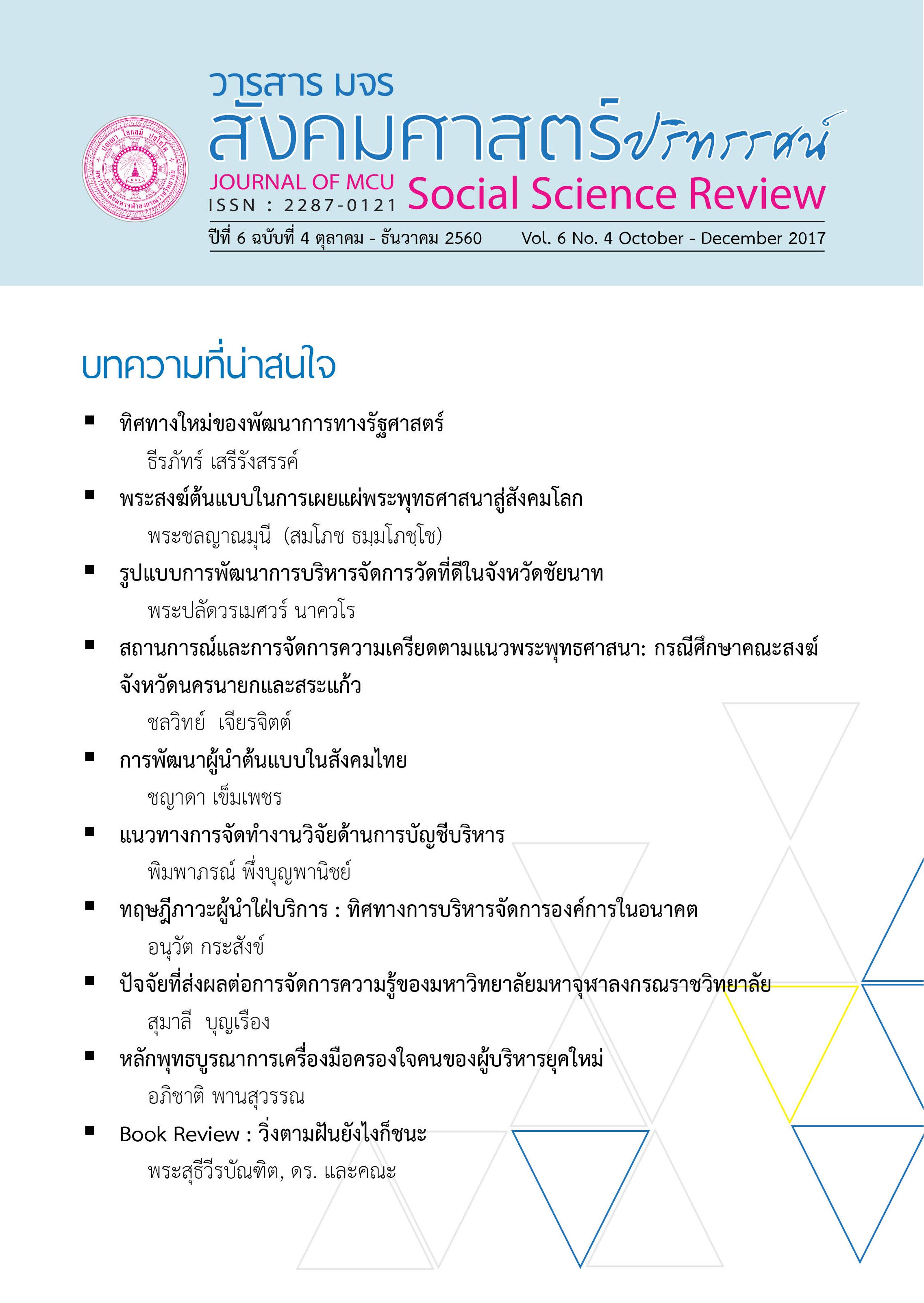ทฤษฎีภาวะผู้นำใฝ่บริการ : ทิศทางการบริหารจัดการขององค์การในอนาคต
คำสำคัญ:
ภาวะผู้นำใฝ่บริการ, ทิศทางการบริหารจัดการขององค์การบทคัดย่อ
บทความฉบับนี้ ผู้เขียนนำเสนอทฤษฎีภาวะผู้นำใฝ่บริการ : ทิศทางการบริหารจัดการขององค์การในอนาคตพบว่ามีองค์ประกอบที่สำคัญ 4 ประการ คือ 1) ตัวผู้นำ 2) ผู้ตาม
3) การเปลี่ยนแปลง 4) อิทธิหรือแรงบันดาลใจที่ทำให้เกิดการเปลี่ยนแปลง ภาวะผู้นำแบบใฝ่บริการยังสอดคล้องกับหลักธรรมสำหรับผู้บริหารหรือผู้ปกครอง อันเป็นธรรมเครื่องยึดเหนี่ยวความเห็นอกเห็นใจของบุคคล และประสานหมู่ชนให้สามัคคี เป็นหลักการของการสงเคราะห์มีพื้นฐานบนความเห็นอกเห็นใจผู้อื่น การปฏิบัติด้วยความศรัทธา การยึดหลักการของการรับใช้และให้บริการ การกระทำความดีเพื่อการอยู่ร่วมกัน
เอกสารอ้างอิง
________.(2016).Buddhist Human Resource Management. Bangkok: Mahachula-
longkornrajavathayalaya Printing.
DuBrin, J . Andrew. (2007). Leadership Research Findings, Practice, and Skills.5thed, .Boston: Houghton Mifflin Company.
Fred E. Fiedler. (1967). A Theory of Leadership Effectiveness, New York: McGraw Hill.
Fullan,M.. (2004). Leading in a Culture of Change. San Francisco : Jossey – Bass.
Paul Hensey, Kenneth H. Blanchard. (1994). Management of Organisational Behaviour. New Delhi : Prentici Hall.
Spears & Lawence,M, (2002). Focus on Leadership : Servant Leadership for the Twenty – First Century. New York. NY : John Wiley & Sons
Natchuda Wijitjammaree. (2010). Communication in Organization. Bangkok: Sirima.
ดาวน์โหลด
รูปแบบการอ้างอิง
ฉบับ
ประเภทบทความ
สัญญาอนุญาต
ลิขสิทธิ์ (c) 2017 วารสาร มจร สังคมศาสตร์ปริทรรศน์

อนุญาตภายใต้เงื่อนไข Creative Commons Attribution-NonCommercial-NoDerivatives 4.0 International License.
เพื่อให้เป็นไปตามกฎหมายลิขสิทธิ์ ผู้นิพนธ์ทุกท่านต้องลงลายมือชื่อในแบบฟอร์มใบมอบลิขสิทธิ์บทความให้แก่วารสารฯ พร้อมกับบทความต้นฉบับที่ได้แก้ไขครั้งสุดท้าย นอกจากนี้ ผู้นิพนธ์ทุกท่านต้องยืนยันว่าบทความต้นฉบับที่ส่งมาตีพิมพ์นั้น ได้ส่งมาตีพิมพ์เฉพาะในวารสาร มจร สังคมศาสตร์ปริทรรศน์ เพียงแห่งเดียวเท่านั้น หากมีการใช้ภาพหรือตารางหรือเนื้อหาอื่นๆ ของผู้นิพนธ์อื่นที่ปรากฏในสิ่งตีพิมพ์อื่นมาแล้ว ผู้นิพนธ์ต้องขออนุญาตเจ้าของลิขสิทธิ์ก่อน พร้อมทั้งแสดงหนังสือที่ได้รับการยินยอมต่อบรรณาธิการ ก่อนที่บทความจะได้รับการตีพิมพ์ หากไม่เป็นไปตามข้อกำหนดเบื้องต้น ทางวารสารจะถอดบทความของท่านออกโดยไม่มีข้อยกเว้นใดๆ ทั้งสิ้น





